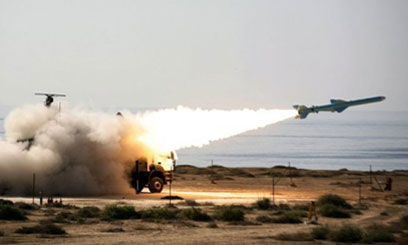“We advise and insist that this warship not return to its former base in the Persian Gulf,” said Brigadier General Ataollah Salehi, Iran’s armed forces chief.
“We don’t have the intention of repeating our warning, and we warn only once,” he was quoted as saying by the armed forces’ official website.
The US carrier would face the “full force” of the Iranian navy if it returns, a navy spokesman, Commodore Mahmoud Mousavi, told Iran’s Arabic television service Al-Alam.
The ominous message came just after Iran completed 10 days of naval manoeuvres at the entrance to the Gulf to show it could close the strategic oil shipping channel in the Strait of Hormuz if it felt threatened.
In the climax of the war games on Monday, Iran test-fired three missiles – including a new cruise missile – designed to sink warships.
The aircraft carrier Salehi was referring to is the USS John C. Stennis, one of the US navy’s biggest warships. The massive, nuclear-powered vessel transports up to 90 fighter jets and helicopters and is usually escorted by around five destroyers. It is close to finishing its seven-month deployment at sea.
The carrier last week passed through the Strait of Hormuz heading east across the Gulf of Oman and through the zone where the Iranian navy was holding its manoeuvres. The US Defence Department called its passage “routine”.
The potential for an Iran-US conflict sent a shiver through oil markets on Tuesday, pushing oil prices up around $2 a barrel.
There was no sign of a let-up in the tensions.
At the weekend, US President Barack Obama signed into law new sanctions targeting Iran’s central bank, which processes most of the Islamic republic’s oil export sales.
The European Union, which is mulling an embargo on Iranian oil, is expected to announce further sanctions of its own at the end of January.
French Foreign Minister Alain Juppe said he was convinced Iran was pursuing nuclear weapons, and he wanted to see “stricter sanctions” applied on Iran.
The Western sanctions add to four sets of UN sanctions imposed over Iran’s nuclear activities.
The United States and many Western nations believe Iran is developing an atomic arsenal.
Tehran denies that, saying its nuclear programme is exclusively for energy production and medical isotopes.
In a statement to underline progress it has made, Iran’s atomic energy organisation said on Sunday its scientists had made the country’s first nuclear fuel rod from indigenous uranium.
Iran’s armed forces chief-of-staff, General Hassan Firouzabadi, added to the defiance by saying Tuesday that the Revolutionary Guards, an elite military force apart from the regular defence services, would soon hold its own naval manoeuvres in the Gulf.
Foreign ministry spokesman Ramin Mehmanparast told reporters that “the foreign forces” present in the Gulf – meaning the US Navy – “are against the security of the region.”
He said Iran’s war games underlined his country’s commitment to ensuring “stability and security in the region.”
Despite the increasingly bellicose stand Iran’s military was taking, Tehran suggested it was keeping the door open to negotiating with world powers over its nuclear programme.
Iran was waiting for EU foreign policy chief Catherine Ashton to set a date and venue for a meeting to discuss resuming talks that have been stalled for nearly a year, Mehmanparast said.
But a spokesman for Ashton shot back immediately that Iran “must first respond” to an October letter from Ashton sent proposing renewed talks, “and then we’ll take it from there.”
The negotiations were being held with the five permanent members of the UN Security Council — Britain, China, France, Russia and the United States, plus non-permanent member Germany.
International pressure has already hit Iran’s economy by scaring off foreign investors.
Iran’s currency, the rial, went into a nosedive on Monday, losing 12 percent, after Obama put the new US measures into effect.
It recovered on Tuesday when Iran pumped foreign exchange into the market, according to Commerce Minister Mehdi Ghazanfari, quoted by the IRNA news agency.
Mehmanparast said the volatility “definitely has nothing to with sanctions.”
“What’s happening with the exchange market has its roots elsewhere,” such as domestic movements of capital, he said.










































